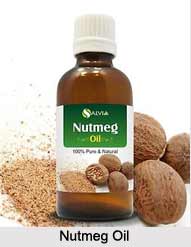 Nutmeg Oil is derived from Nutmeg (Myristica fragrans), one of the two spices derived from several tree species of the Myristica family. These are evergreen trees growing up to 20 metres (65 feet) with dense foliage and small faded yellow flowers, native to the Moluccas (Maluku Islands in Indonesia) but also found in Penang (in Malaysia), Java (in Indonesia) and Sri Lanka. The volatile essential oil is obtained by steam distillation of dried kernels of ripe nutmeg seeds. The oil was used by ancient civilizations; Indians used it to help treat intestinal ailments. Also used in Ayurvedic medicine, the oil in aromatherapy is used to fight inflammations, muscular and rheumatic pain, assist the digestive and reproductive systems and stimulate the mind. It has a sharp, spicy and rather musky aroma.
Nutmeg Oil is derived from Nutmeg (Myristica fragrans), one of the two spices derived from several tree species of the Myristica family. These are evergreen trees growing up to 20 metres (65 feet) with dense foliage and small faded yellow flowers, native to the Moluccas (Maluku Islands in Indonesia) but also found in Penang (in Malaysia), Java (in Indonesia) and Sri Lanka. The volatile essential oil is obtained by steam distillation of dried kernels of ripe nutmeg seeds. The oil was used by ancient civilizations; Indians used it to help treat intestinal ailments. Also used in Ayurvedic medicine, the oil in aromatherapy is used to fight inflammations, muscular and rheumatic pain, assist the digestive and reproductive systems and stimulate the mind. It has a sharp, spicy and rather musky aroma.
Health Benefits of Nutmeg Oil
Nutmeg Oil has immense therapeutic properties of an antiseptic, carminative, sedative, antispasmodic, stimulant, anti-rheumatic, digestive, laxative, tonic etc. The different benefits derived from it include:
•Relief from congestion and cold symptoms;
•Detoxification of Liver;
•Treatment of Kidney infections and diseases;
•Moderation and normalisation of depression, mood swings and hormonal imbalance;
•Stimulation of cardiovascular system;
•Removal of bad breath through its aroma;
•Relief from toothaches and aching gums;
•Relief from stomach aches.
Nutmeg Oil can act as a natural painkiller and treat menstrual discomfort with its emmenagogue properties. It has a sedating effect that relieves stress and drives sound sleep. It stimulates the mind and enhances concentration. It is helpful in fighting gallstones, nausea, chronic vomiting and diarrhoea. It also encourages appetite and averts constipation. It can bring relief from impotence and aid births by strengthening contractions.
Other Uses of Nutmeg Oil
Apart from the medicinal angle, Nutmeg Oil is a natural flavouring substitute to ground nutmeg which can leave food particles in food and beverages. It is used in manufacturing of soaps given its antiseptic properties. Also being an antibacterial along with antiseptic, it is used in making many cosmetic products, particularly meant for oily, dull and wrinkled skin. It is also applied in men"s aftershave lotions. Due to its pleasant aroma it is also used in room fresheners and perfumes. It is also used in the tobacco industry, to slightly alter the flavour of the tobacco blend. Nutmeg Oil also blends well with other essential oils such as lavender, rosemary, eucalyptus, ginger, black pepper, clary sage and others.
Precautions in Nutmeg Oil
Nutmeg oil is considered non-toxic, non-irritant and non-sensitizing, yet in excess dosage may become toxic with symptoms such as nausea and stupor. The myristicin content of this oil has hallucinogenic properties. The oil should be used in moderation and always after diluted with a carrier oil, such as olive, coconut or almond, as it is very concentrated like other essential oils. Being a stimulant, it should not be used by people with epilepsy and avoided in pregnancy. It should be cautiously used to see if it causes any sensitivity and thus should be kept away from children under the age of 6.
Side Effects of Nutmeg Oil
Overdose of Nutmeg Oil can act as a stimulant or depressant to the central nervous system, resulting in any of the given side effects:
•Hallucinations and delirium
•Visual impairment
•Prolonged sleep
•Vomiting
Nutmeg Oil and its aroma can be helpful to the digestive and nervous systems, muscular aches and invigorating the mind when consumed using burners and vaporizers. It can relieve gout, rheumatism and arthritis, gallstones, circulation and sexual problems when used as blended massage oil or diluted in bath. In creams and lotions, it is useful for the skin and hair.




